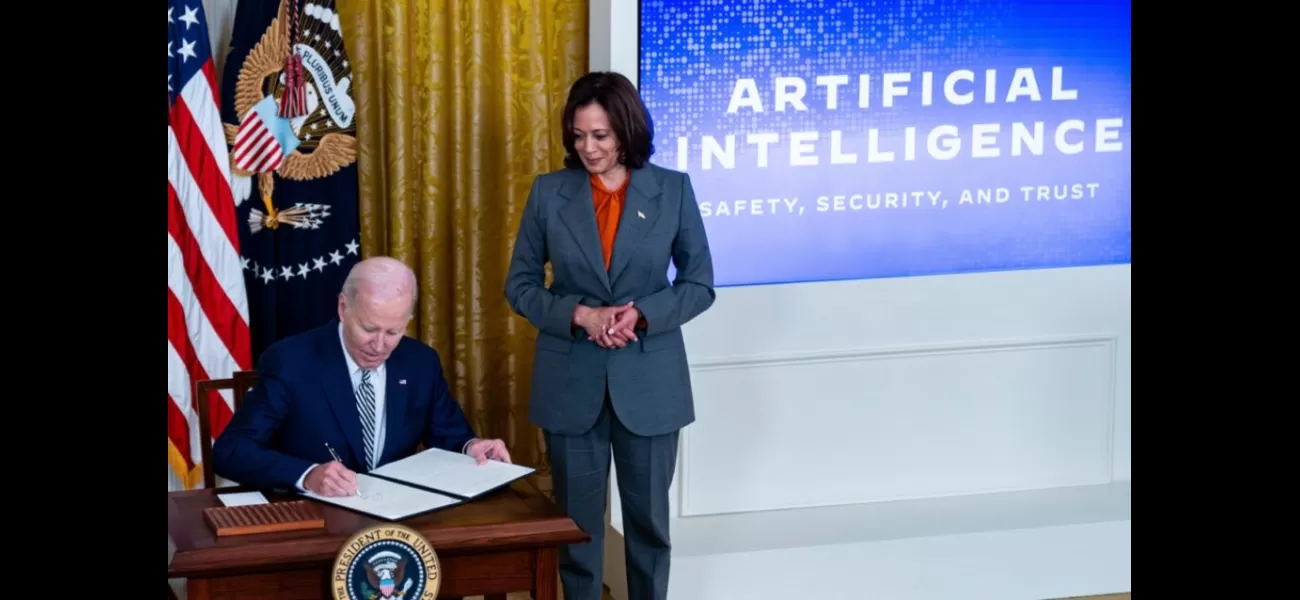Biden Administration sets rules for government's AI usage.
Agencies must designate key positions for A.I., such as chief A.I. officer and senior implementation role, in accordance with new rules.
April 10th 2024.

The Biden Administration has recently announced a set of new guidelines that will govern how federal agencies can use artificial intelligence. These regulations, released in a memo by the Office of Management and Budget, aim to strike a balance between mitigating potential risks and promoting innovation. To ensure the effective implementation of these guidelines, each agency will be required to appoint a chief artificial intelligence officer and a senior role to oversee the use of AI. In addition, the administration plans to hire close to 100 professionals in the field by the summer of 2024.
Interestingly, the initial draft of this memo was introduced before Vice President Harris embarked on her trip to the UK for the first global AI summit in the fall of 2023. It was then made available for public commentary before the final version was officially released on March 28th. Speaking about the new regulations, Harris emphasized the need for them to prioritize the public interest on a global scale. She also expressed the administration's hope that these domestic policies will serve as a model for other countries to follow.
As per the guidelines, agencies must put in place certain safeguards by December 1st, including assessing, testing, and monitoring the impacts of AI. Failure to comply with these measures will result in the suspension of AI use, unless deemed necessary for the functioning of the agency. This is because, as stated by Shalanda Young, Director of the Office of Management and Budget, AI has the potential to cause harm and it is crucial for Americans to trust the government's use of it.
Young further added, "The public deserves confidence that the federal government will use this technology responsibly." It is worth noting that several government agencies are already utilizing AI, but the new memo provides more specific guidance on its use, including its application in extreme weather forecasting, disease control, and opioid management.
This move by the administration is a significant step towards ensuring safe and ethical practices in the use of AI, an issue that private companies and other countries are also grappling with. In fact, in December 2023, the European Union passed the AI Act, a legislation that will regulate the creation and use of AI technologies. Similarly, China is also said to be working on stricter regulations for AI.
However, officials believe that there is still more work to be done beyond just setting guidelines. Alex Reeve Givens, president and CEO of the Center for Democracy and Technology, raised questions about the government's testing requirements and who will be responsible for approving them. He stated, "I see this as just the first step. What will come next are detailed practice guides and expectations for effective auditing." Givens also recommended that the administration release information on procurement processes and the requirements for companies with AI technology that the government is considering purchasing.
In conclusion, the Biden Administration's new guidelines on the use of artificial intelligence are a crucial step in ensuring responsible and ethical practices. However, there is still more work to be done, and the administration plans to continue working towards building a trustworthy and transparent AI framework.
Interestingly, the initial draft of this memo was introduced before Vice President Harris embarked on her trip to the UK for the first global AI summit in the fall of 2023. It was then made available for public commentary before the final version was officially released on March 28th. Speaking about the new regulations, Harris emphasized the need for them to prioritize the public interest on a global scale. She also expressed the administration's hope that these domestic policies will serve as a model for other countries to follow.
As per the guidelines, agencies must put in place certain safeguards by December 1st, including assessing, testing, and monitoring the impacts of AI. Failure to comply with these measures will result in the suspension of AI use, unless deemed necessary for the functioning of the agency. This is because, as stated by Shalanda Young, Director of the Office of Management and Budget, AI has the potential to cause harm and it is crucial for Americans to trust the government's use of it.
Young further added, "The public deserves confidence that the federal government will use this technology responsibly." It is worth noting that several government agencies are already utilizing AI, but the new memo provides more specific guidance on its use, including its application in extreme weather forecasting, disease control, and opioid management.
This move by the administration is a significant step towards ensuring safe and ethical practices in the use of AI, an issue that private companies and other countries are also grappling with. In fact, in December 2023, the European Union passed the AI Act, a legislation that will regulate the creation and use of AI technologies. Similarly, China is also said to be working on stricter regulations for AI.
However, officials believe that there is still more work to be done beyond just setting guidelines. Alex Reeve Givens, president and CEO of the Center for Democracy and Technology, raised questions about the government's testing requirements and who will be responsible for approving them. He stated, "I see this as just the first step. What will come next are detailed practice guides and expectations for effective auditing." Givens also recommended that the administration release information on procurement processes and the requirements for companies with AI technology that the government is considering purchasing.
In conclusion, the Biden Administration's new guidelines on the use of artificial intelligence are a crucial step in ensuring responsible and ethical practices. However, there is still more work to be done, and the administration plans to continue working towards building a trustworthy and transparent AI framework.
[This article has been trending online recently and has been generated with AI. Your feed is customized.]
[Generative AI is experimental.]
0
0
Submit Comment





